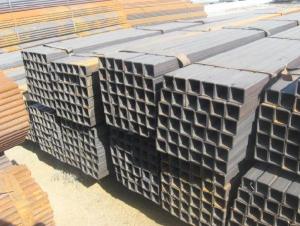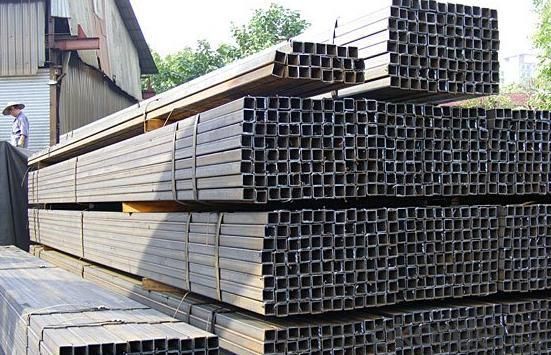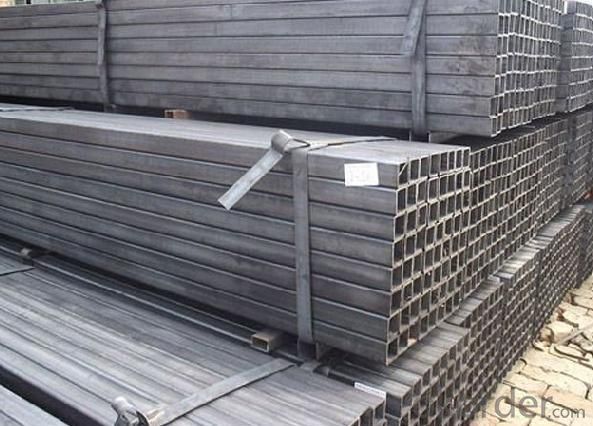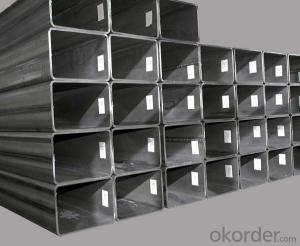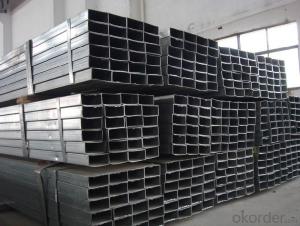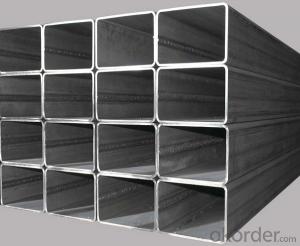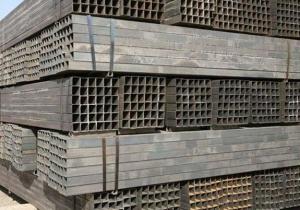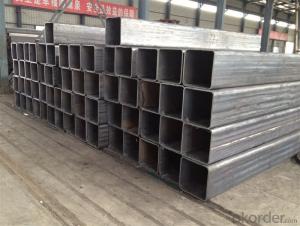Hollow Section-Square Tubes
- Loading Port:
- Tianjin
- Payment Terms:
- TT or L/C
- Min Order Qty:
- 50MT m.t.
- Supply Capability:
- based on order m.t./month
OKorder Service Pledge
OKorder Financial Service
You Might Also Like
Hollow Section-Square Tubes
Application:
It is widely used in building, machine, chemical equipment, automobile industrial, container, it is also applied to agriculture and mine machine.
Standard:
ASTM A500, GB6728
Steel grade:
ASTM A500: A, B, C
GB6728:Q195,Q215,Q235,Q345
Size of Pipe:
*Remark: Besides below sizes, we also can arrange production based on requirement of customers
SIZE(mm) | THICKNESS(mm) |
10×10 | 0.6-1.0 |
12×12 | 0.6-1.0 |
16×16 | 0.6-1.2 |
19×19 | 0.6-1.5 |
20×20 | 1.6-1.5 |
25×25 | 1.0-2.75 |
30×30 | 1.0-2.75 |
32×32 | 1.0-3.0 |
38×38 | 1.0-3.0 |
40×40 | 1.0-3.5 |
50×50 | 1.0-5.0 |
60×60 | 1.0-6.0 |
63.5×63.5 | 1.0-6.0 |
70×70 | 1.5-6.0 |
75×75 | 1.5-6.0 |
80×80 | 2.0-6.0 |
90×90 | 2.0-6.0 |
100×100 | 2.3-6.0 |
120×120 | 4.0-6.0 |
125×125 | 4.0-6.0 |
150×150 | 4.0-8.0 |
200×200 | 6.0-12 |
250×250 | 6.0-12 |
300×300 | 6.0-12 |
400×400 | 6.0-12 |
Standard: ASTM A500
Chemical Composition(%)
Chemical Requirement | ||||
| Composition % | |||
Grade A | Grade B | |||
Heat | Product | Heat | Product | |
Element | analysis | analysis | analysis | analysis |
Carbon max | 0.26 | 0.3 | 0.22 | 0.26 |
Manganese max | … | … | 1.4 | 1.45 |
Phosphorus, max | 0.035 | 0.045 | 0.03 | 0.04 |
Sulfur max | 0.035 | 0.045 | 0.02 | 0.03 |
Where an ellipsis (...)appears in this table, there is no requirement | ||||
For each reduction of 0.01 percentage point below the specified maximum for carton, and increase of 0.06 percentage point above the specified maximum for manganese is permitted, up to a maximum of 1.50% by heat analysis and 1.6% by product analysis | ||||
Mechanical Properties
Tensile Requirement | ||
| Grade A | Grade B |
Tensile strength, min, psi (Mpa) | 48000 (400) | 70000 (483) |
Yield strength, min, psi (Mpa) | 36000 (250) | 50000 (345) |
Elongation in 2 in. (50.8mm), min, % | 23 | 23 |
GB6728:
Steel Grade |
CHEMICAL COMPOSITION |
MECHANICAL PROPERTIES | ||||||
|
C (%) |
Si (%) |
Mn
(%) |
P(%)
Max |
S (%)
Max |
YS(Mpa)
Min |
TS(Mpa)
Min |
El (%)
Min |
Q195 |
0.06-0.012 |
0.3 |
0.25-0.5 |
0.45 |
0.5 |
195 |
315 |
22 |
Q215 |
0.09-0.15 |
0.3 |
0.25-0.55 |
0.45 |
0.5 |
215 |
335 |
22 |
Q235 |
0.12-0.22 |
0.3 |
0.3-0.7 |
0.45 |
0.45 |
235 |
375 |
20 |
Q345 |
0.20 |
0.55 |
1.0-1.6 |
0.45 |
0.45 |
345 |
510 |
21 |
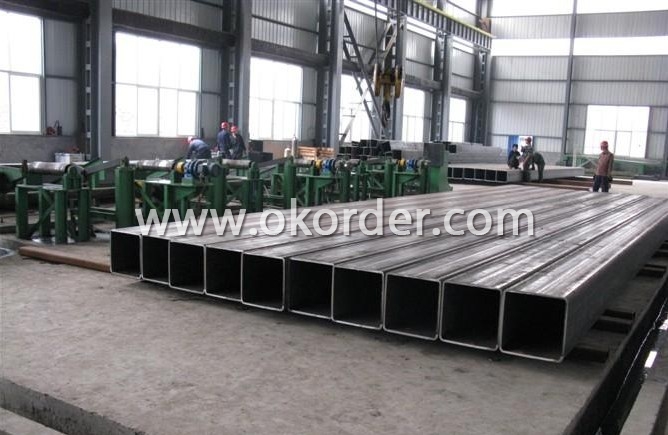
Square Welded Hollo Sectio/Welded Rectangle Hollow Section
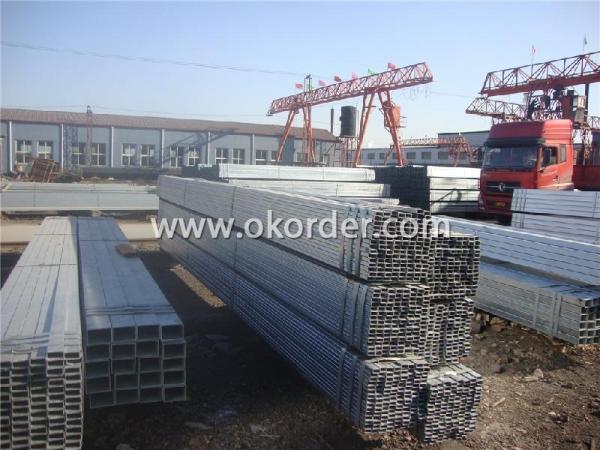
- Q: Can steel pipes be used for structural supports?
- Yes, steel pipes can be effectively used as structural supports due to their high strength, durability, and ability to withstand heavy loads.
- Q: Are steel pipes suitable for industrial cooling systems?
- Yes, steel pipes are suitable for industrial cooling systems. They are highly durable, resistant to corrosion, and can withstand high pressures and temperatures. Additionally, steel pipes have excellent heat transfer properties, making them efficient for cooling applications.
- Q: How are steel pipes recycled at the end of their life cycle?
- Steel pipes are typically recycled at the end of their life cycle by first being collected and sorted at recycling facilities. They are then cleaned and processed to remove any contaminants. The pipes are further broken down into smaller pieces and melted in a furnace. Once the molten steel is formed, it can be used to create new steel products, such as pipes or other construction materials. This recycling process helps reduce the demand for new steel production and conserves valuable resources.
- Q: What are the different methods of cleaning steel pipes?
- There are several methods of cleaning steel pipes, including mechanical cleaning, chemical cleaning, and high-pressure water jetting. Mechanical cleaning involves the use of brushes, scrapers, or other abrasive tools to remove dirt and debris from the pipe's surface. Chemical cleaning involves the application of solvents or acids to dissolve tough stains or residues. High-pressure water jetting uses a powerful stream of water to dislodge and remove contaminants from the pipe. These methods can be used individually or in combination depending on the specific cleaning requirements.
- Q: What are the different types of coatings applied to steel pipes?
- There are several types of coatings applied to steel pipes, including epoxy coatings, fusion-bonded epoxy (FBE) coatings, polyethylene (PE) coatings, polyurethane (PU) coatings, and zinc coatings.
- Q: What is the role of steel pipes in the renewable energy sector?
- The transportation and distribution of various energy sources in the renewable energy sector heavily rely on steel pipes. An important application of steel pipes is seen in the construction of pipelines for transporting natural gas, which is increasingly being used as a cleaner alternative to traditional fossil fuels. Due to its strength, durability, and resistance to corrosion, steel is commonly chosen for these pipelines, ensuring the secure and efficient delivery of natural gas to power plants and other energy consumers. Furthermore, steel pipes are utilized in the installation of geothermal energy systems. Geothermal energy utilizes the heat from the earth's core to generate electricity or provide heating and cooling. Steel pipes are employed to create geothermal wells, allowing the extraction of hot water or steam from underground reservoirs. These pipes must withstand high temperatures and pressures, making steel an ideal material for this purpose. Additionally, hydraulic systems for hydroelectric power plants heavily rely on steel pipes. These power plants generate electricity using the force of flowing water, and steel pipes are used to convey water from the reservoir to the turbines. The durability and reliability of steel ensure the efficient transmission of water, enabling hydroelectric power plants to produce clean and renewable energy. In the construction of solar power plants, steel pipes also play a crucial role. Solar thermal systems concentrate sunlight to generate heat, which is then transferred to a fluid to produce steam and drive turbines. Steel pipes are essential for circulating and transferring this fluid, ensuring the effective operation of the solar power plant. In conclusion, steel pipes are indispensable in the renewable energy sector due to their strength, durability, and resistance to corrosion. They facilitate the transportation of natural gas, the extraction of geothermal energy, the transmission of water in hydroelectric power plants, and the circulation of fluids in solar power plants. By enabling the efficient distribution of various energy sources, steel pipes significantly contribute to the growth and sustainability of the renewable energy sector.
- Q: Theoretical weight of 25*25*1.5 square steel tubes
- Theoretical weight can be directly from the steel tube under the table look up, you can also press type calculation:Weight per meter =4x, wall thickness x (side length - wall thickness) x0.00785. The length of the square tube and the wall thickness are in millimeters, and the weight of each square meter is in kilograms.
- Q: Can steel pipes be used for conveying abrasive slurries?
- Yes, steel pipes can be used for conveying abrasive slurries. Steel pipes are known for their durability and strength, making them suitable for handling abrasive materials such as slurries. However, to ensure longevity and prevent excessive wear, it is important to select the appropriate grade of steel and consider factors such as pipe thickness, lining options, and flow velocity. Additionally, implementing proper maintenance and inspection procedures can help to detect and address any wear or corrosion that may occur over time.
- Q: How to make the steel pipe spray paint is not easy to fall off?
- First you will rust steel, to clean, good quality alkyd rustproof paint, completely dry after brushing paint, color to see his kind of love.
- Q: How are steel pipes used in the mining industry?
- Steel pipes are widely used in the mining industry for various purposes such as transporting water, slurry, and other fluids, as well as for ventilation and structural support in underground mines. Their durability, resistance to corrosion, and high pressure capacity make them ideal for these applications.
1. Manufacturer Overview
| Location | Tianjin,China |
| Year Established | 2000 |
| Annual Output Value | Above Thirty Million RMB |
| Main Markets | China; Europe |
| Company Certifications | ISO9001:2000 |
2. Manufacturer Certificates
| a) Certification Name | |
| Range | |
| Reference | |
| Validity Period |
3. Manufacturer Capability
| a) Trade Capacity | |
| Nearest Port | Tianjin;Qingdao |
| Export Percentage | 41% - 50% |
| No.of Employees in Trade Department | |
| Language Spoken: | English;Chinese |
| b) Factory Information | |
| Factory Size: | 53000square meter |
| No. of Production Lines | |
| Contract Manufacturing | OEM Service Offered;Design Service Offered |
| Product Price Range | Low Average |
Send your message to us
Hollow Section-Square Tubes
- Loading Port:
- Tianjin
- Payment Terms:
- TT or L/C
- Min Order Qty:
- 50MT m.t.
- Supply Capability:
- based on order m.t./month
OKorder Service Pledge
OKorder Financial Service
Similar products
Hot products
Hot Searches
Related keywords
